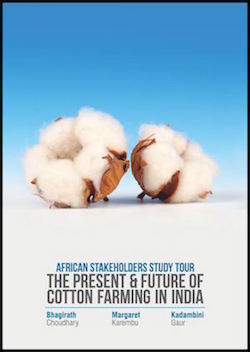
African Stakeholders Study Tour Strengthens India-African Collaboration in Cotton and Textile Sector
April 6, 2016
| |

The strong collaboration and stewardship measures put in place, managed by the Government of India, Universities and private sector players were impressive. Among the take-home messages were the need for a strong extension service to support Bt cotton farmers, the concerted efforts of different players to sustain adoption and the wide range of varietal choices of Bt cotton hybrids that Indian farmers have at their disposal due to an elaborate breeding program. It is our hope that the Indian model of holistic technology application in the cotton sector that has made India number one in world cotton production will inform decision makers in Africa for the benefit of millions of farmers who depend on the crop for their livelihood.
The visit was organized by the ISAAA AfriCenter and the South Asia Biotechnology Center (SABC-India) in partnership with COMESA/ACTESA, the Open Forum on Agricultural Biotechnology (OFAB-Kenya) and the Program for Biosafety Systems (PBS). Partial support was also received from the United States Department of Agriculture (USDA) and Mahyco Seeds Company.
For more on the report and future biotech study tour inquiries, contact: Dr. Margaret Karembu at mkarembu@isaaa.org and Mr. Bhagirath Choudhary at bhagirath@sabc.asia.
| |
Biotech Updates is a weekly newsletter of ISAAA, a not-for-profit organization. It is distributed for free to over 22,000 subscribers worldwide to inform them about the key developments in biosciences, especially in biotechnology. Your support will help us in our mission to feed the world with knowledge. You can help by donating as little as $10.
-
See more articles:
-
News from Around the World
- New Global Food Policy Report Says How We Feed the World is Unsustainable
- African Stakeholders Study Tour Strengthens India-African Collaboration in Cotton and Textile Sector
- Purdue University Innovation to Help Crops Survive Long Drought
- Rice can Borrow Stronger Immunity from Other Plants
- Scientists Turn to Ancient Wheat Genes to Ensure the Crop's Future
- Key Regulator of Flower Head Development in Rice Discovered
- Australian OGTR Issues License for Commercial Release of Herbicide Tolerant GM Canola
- In Biotech Breakthrough, Scientists Discover Reverse Photosynthesis
-
Research Highlights
- Bitter Orange PtrA/NINV Gene Confers Tolerance to Multiple Abiotic Stresses
- Secretion of the Bacterial Phytase by Transgenic Arabidopsis Increases Phosphate Acquisition
- MdcyMDH Overexpression Enhances Stress Tolerance in Apple
-
Beyond Crop Biotech
- International Consortium Sequence Mosquito Sex Chromosome
- Researchers Develop Programming Language for Living Cells
- Zika Virus Structure Revealed by Researchers
-
Announcements
- Himmelfahrtstagung: New Frontiers for Biotech-Processes
-
Read the latest: - Biotech Updates (December 17, 2025)
- Gene Editing Supplement (December 17, 2025)
- Gene Drive Supplement (February 22, 2023)
-
Subscribe to BU: - Share
- Tweet
